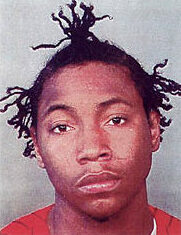Related Research Articles

The Racketeer Influenced and Corrupt Organizations (RICO) Act is a United States federal law that provides for extended criminal penalties and a civil cause of action for acts performed as part of an ongoing criminal organization. The RICO Act focuses specifically on racketeering and allows the leaders of a syndicate to be tried for the crimes they ordered others to do or assisted them in doing, closing a perceived loophole that allowed a person who instructed someone else to, for example, murder, to be exempt from the trial because they did not actually commit the crime personally.

The D.C. sniper attacks were a series of coordinated shootings that occurred during three weeks in October 2002 in the District of Columbia, Maryland, and Virginia. Ten people were killed and three others were critically wounded in the Baltimore-Washington Metropolitan Area and along Interstate 95 in Virginia.
Balbir Singh Sodhi, a Sikh-American gas station owner in Mesa, Arizona, was murdered in a hate crime in the aftermath of the September 11 attacks. This was the first of several cases across the United States that were reported to the police as supposed acts of retaliation for the attacks. Balbir Singh Sodhi, who had a beard and wore a turban in accordance with his Sikh faith, was profiled as an Arab Muslim and murdered by 42-year-old Frank Silva Roque, a Boeing aircraft mechanic at a local repair facility who held a criminal record for an attempted robbery in California. Roque had reportedly told friends that he was "going to go out and shoot some towel-heads" the day of the attacks. Roque was sentenced to death for first degree murder.
The Supreme Team was an organized crime syndicate that operated throughout the 1980s in New York City. Their headquarters was in Baisley Park, in South Jamaica, Queens, New York City, New York. The leaders were Kenneth "Supreme" McGriff and his nephew, Gerald "Prince" Miller. In 1989, McGriff spent 10 years in a federal prison for a narcotics conviction.
Carmine "The Bull" Agnello is a New York mobster from the Gambino crime family who ran a scrap metal recycling operation.

Frances Marion Parker was an American child who was abducted and murdered in Los Angeles, California. Her murder was deemed by the Los Angeles Times "the most horrible crime of the 1920s," and at the time was considered the most horrific crime in California history. In the decades following the murder, Parker's death was the subject of various murder ballads.
John Ashley Brown Jr. was an American from New Orleans who was convicted of first-degree murder and incarcerated on death row in Louisiana State Penitentiary for 12 years. He was one of six inmates featured in the 1998 documentary entitled The Farm: Angola, USA. He was executed in 1997 for the murder of Omer Laughlin in New Orleans in 1984.

Jaswant Singh Khalra (1952–1995) was a Sikh and human rights activist from Punjab, India. He garnered global attention for his research concerning 25,000 illegal killings and cremations involving the Punjab police, and that the police had even killed about 2,000 policemen who refused to cooperate.

Ronell Earl Wilson was convicted of the 2003 capital murder of two undercover New York City police officers in Staten Island, New York. His trial before Judge Nicholas Garaufis of the United States District Court for the Eastern District of New York began on November 27, 2006. On December 20, 2006, he was found guilty of the capital murders as well as other related charges. On January 30, 2007, Wilson was sentenced to death, the first such sentence by a federal jury in New York since the federal death penalty was reinstated in 1988.

Gurmeet Ram Rahim Singh Insan is the head of the Indian social group Dera Sacha Sauda (DSS) since 1990. He is also a convicted rapist, and was convicted of being involved in the murder of journalist Ram Chander Chhatrapati.
Edward Byrne was a police officer in the New York City Police Department who became well known in the United States after he was murdered in the line of duty.

Terry A. Blair is an American serial killer who was convicted of killing seven women in Kansas City, Missouri, though investigators believe he may have additional unidentified victims.

Michael J. Coppola, also known as "Mikey Cigars", is an American mobster and captain in the Genovese crime family. He has been a key figure in the Genovese crime family New Jersey faction. It is unknown if he is related to Michael "Trigger Mike" Coppola, who was also a member of the Genovese family. He made national headlines when he went into hiding for 11 years to avoid a possible murder conviction.
Raymond Yellow Thunder was an Oglala Lakota, born in Kyle, South Dakota, on the Pine Ridge Indian Reservation.

William Ray Bonner is a former service station attendant who went on a shooting spree through the South Side area of Los Angeles, California on April 22, 1973, killing seven people and wounding nine others. The rampage ended with his arrest after he had been injured in a shootout with police.
Michael Dewayne Johnson was a criminal sentenced to death for the 1995 murder of Jeff Wetterman. Johnson committed suicide 15 hours before his scheduled execution.
Boyle v. United States, 556 U.S. 938 (2009), is a decision by the United States Supreme Court involving what constitutes an "enterprise" under the Racketeer Influenced and Corrupt Organizations Act (RICO). The Court, in a 7-2 opinion, held that any group convened to carry out a crime meets the definition of an enterprise, even if it was only created for that purpose.
Capital punishment is a legal penalty in the U.S. state of Missouri.

The murder of Lauren Burk occurred on March 4, 2008, in Alabama. Burk, an 18-year-old freshman at Auburn University, was kidnapped at gunpoint by Courtney Lockhart. Lockhart, a U.S. Military veteran who had been dishonorably discharged, robbed Burk and forced her to strip naked. He drove her around for about 30 minutes, during which he lamented about his unemployment and misfortunes. When Burk attempted to escape Lockhart shot her in the lungs. Burk, who was now severely injured and completely naked except for a pair of socks, was left on Alabama State Route 147. She was later pronounced dead at a local hospital.
References
- ↑ "Rise and Fall of a Gas Czar". Daily News. New York. 13 July 1997. Retrieved 27 February 2015.
- ↑ "Rags-to-riches Sikh businessman charged with murder". Rediff.com. 5 January 1999.
- ↑ Entity Information for Citygas Gasoline Corp. [ permanent dead link ], New York State Department of State Division of Corporations
- ↑ Herszenhorn, David M. (9 July 1997). "Filling Stations' Owner Held in Fraud and Killings". The New York Times. Retrieved 4 May 2010.
- 1 2 3 4 Dan Barry (10 July 1997). "Police Say Man Stopped at Nothing for Gasoline Empire". The New York Times.
- 1 2 "Jury awards life term to Dhinsa". The Tribune. 11 March 1999.
- ↑ "Owner of Gas Station Chain is Described as Killer in Trial". The New York Times. 5 January 1999.
- 1 2 This evidence, along with other evidence obtained from Dhinsa's car, was suppressed during pretrial motions due to doubts of probable cause. Dhinsa claimed that the traffic stop was unconstitutional, and that the seizure of his car six days later constituted an unreasonable search. This decision was overturned before trial; see "Docket No. 98-1605" from U.S. 2nd Circuit Court of Appeals.
- ↑ "Docket No. 98-1605". U.S. 2nd Circuit Court of Appeals. December 1998.
- ↑ "Businessman Is Fined In Two Contract Killings". The New York Times. 17 October 1999.
- ↑ 53546053 - BOP Find an inmate(07/21/2018)